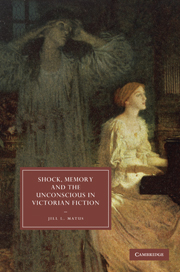Book contents
- Frontmatter
- Contents
- Acknowledgements
- Introduction: the psyche in pain
- 1 Historicizing trauma
- 2 Dream and trance: Gaskell's North and South as a “condition-of-consciousness” novel
- 3 Memory and aftermath: from Dickens's “The Signalman” to The Mystery of Edwin Drood
- 4 Overwhelming emotion and psychic shock in George Eliot's The Lifted Veil and Daniel Deronda
- 5 Dissociation and multiple selves: memory, Myers and Stevenson's “shilling shocker”
- Afterword on afterwards
- Notes
- Selected bibliography
- Index
- CAMBRIDGE STUDIES IN NINETEENTH-CENTURY LITERATURE AND CULTURE
Afterword on afterwards
Published online by Cambridge University Press: 30 January 2010
- Frontmatter
- Contents
- Acknowledgements
- Introduction: the psyche in pain
- 1 Historicizing trauma
- 2 Dream and trance: Gaskell's North and South as a “condition-of-consciousness” novel
- 3 Memory and aftermath: from Dickens's “The Signalman” to The Mystery of Edwin Drood
- 4 Overwhelming emotion and psychic shock in George Eliot's The Lifted Veil and Daniel Deronda
- 5 Dissociation and multiple selves: memory, Myers and Stevenson's “shilling shocker”
- Afterword on afterwards
- Notes
- Selected bibliography
- Index
- CAMBRIDGE STUDIES IN NINETEENTH-CENTURY LITERATURE AND CULTURE
Summary
Central to Victorian thinking about consciousness and the effects on consciousness of overwhelming emotion, shock is a topic that engages a wide variety of Victorian writers, not least mental physiologists and novelists. The previous chapters of this book have attempted to excavate Victorian thinking around the concept of shock in order to show that itprovides, at one and the same time, a significant “prehistory” of current conceptions of trauma and evidence of the role of literature in the cultural formation of trauma.
Late-modern theories of trauma imply and depend on assumptions about the unconscious mind and the way we process emotion that derive largely from Freud. Victorian theories about shock depend on rather different ideas about the architecture of the psyche and the nature of the unconscious mind. While it has not been the purpose of this book to compare Victorian and Freudian theories of the mind exhaustively, my excavation of earlier theories should provide a sharpened sense of the historical contingency of trauma theory. In principle, most critics would readily concede that contingency, but in practice a fairly limited set of propositions tends to be extracted from the field and applied as if they were universal and transcendent of culture and history. A more precise grasp of the pre-Freudian history of the wounded mind should dispel any universalized or transcendent notion of “the unconscious” and might also therefore broaden the current narrow focus on memory in contemporary approaches to trauma.
If I had gone forward on the (widely accepted) assumption that memory loss or dysfunction is the prime indicator of traumatic experience, I would have found some evidence of Victorian culture's engagement with emotional shock.
- Type
- Chapter
- Information
- Shock, Memory and the Unconscious in Victorian Fiction , pp. 183 - 191Publisher: Cambridge University PressPrint publication year: 2009



